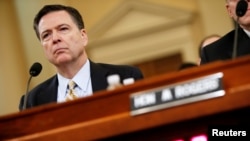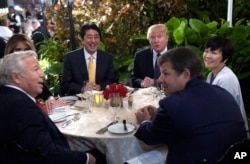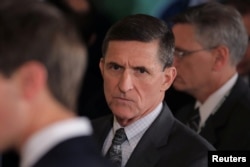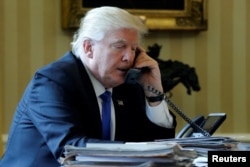Former Federal Bureau of Investigation Director James Comey was leading the agency's investigation of Russian interference in last year's U.S. presidential election when President Donald Trump, frustrated by the ongoing probe, fired him last month.
On Thursday, Comey is testifying before the Senate Intelligence Committee, one of several congressional panels probing possible collusion between Trump campaign aides and Russian officials, about his conversations with Trump over the past several months.
Here are several excerpts about Comey's recollections, from his expected opening statement to the Senate panel.
From a one-on-one Jan. 27 dinner with Trump at the White House.
"My instincts told me that the one-on-one setting, and the pretense that this was our first discussion about my position, meant the dinner was, at least in part, an effort to have me ask for my job and create some sort of patronage relationship. That concerned me greatly, given the FBI's traditionally independent status in the executive branch.
"I replied that I loved my work and intended to stay and serve out my 10-year term as director. And then, because the set-up made me uneasy, I added that I was not "reliable" in the way politicians use that word, but he could always count on me to tell him the truth. I added that I was not on anybody's side politically and could not be counted on in the traditional political sense, a stance I said was in his best interest as the president.
"A few moments later, the president said, "I need loyalty, I expect loyalty." I didn't move, speak or change my facial expression in any way during the awkward silence that followed. We simply looked at each other in silence. The conversation then moved on, but he returned to the subject near the end of our dinner."
From a Feb. 14 meeting with Trump in the Oval Office at the White House. Trump had fired National Security Advisor Michael Flynn the day before.
"The president then returned to the topic of Mike Flynn, saying, 'He is a good guy and has been through a lot.' He repeated that Flynn hadn't done anything wrong on his calls with the Russians but had misled the vice president. He then said, 'I hope you can see your way clear to letting this go, to letting Flynn go. He is a good guy. I hope you can let this go.' I replied only that 'he is a good guy.'
"I had understood the president to be requesting that we drop any investigation of Flynn in connection with false statements about his conversations with the Russian ambassador in December. I did not understand the president to be talking about the broader investigation into Russia or possible links to his campaign. I could be wrong, but I took him to be focusing on what had just happened with Flynn's departure and the controversy around his account of his phone calls. Regardless, it was very concerning given the FBI's role as an independent investigative agency."
From a March 30 phone call to Comey.
"On the morning of March 30, the president called me at the FBI. He described the Russia investigation as 'a cloud' that was impairing his ability to act on behalf of the country. He said he had nothing to do with Russia, had not been involved with hookers in Russia, and had always assumed he was being recorded when in Russia. He asked what we could do to 'lift the cloud.' I responded that we were investigating the matter as quickly as we could, and that there would be great benefit, if we didn't find anything, to our having done the work well. He agreed, but then re-emphasized the problems this was causing him."








